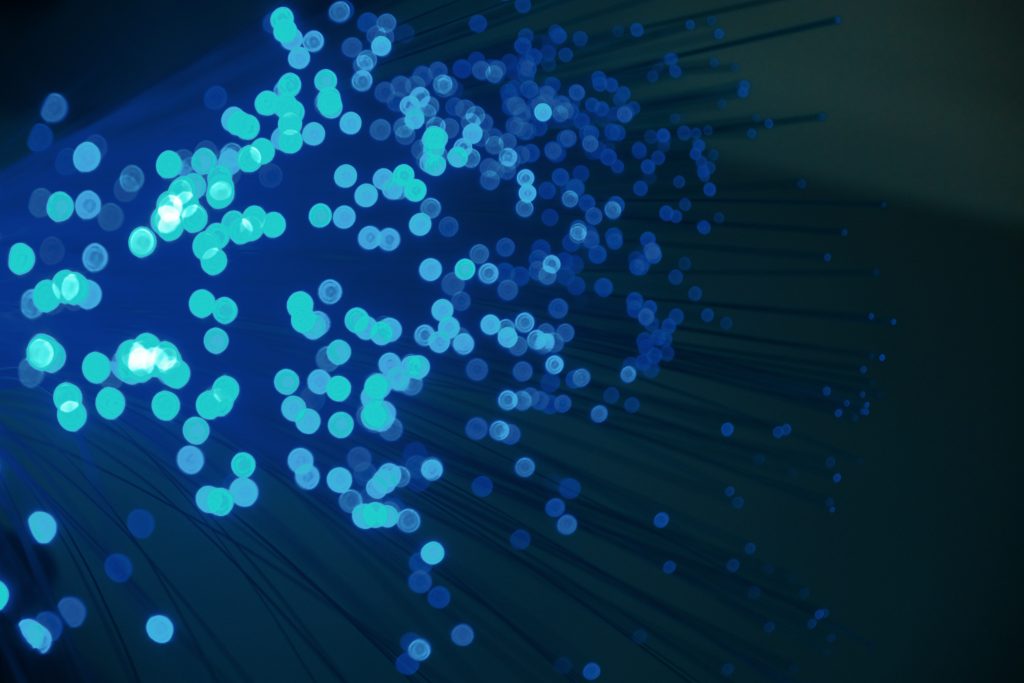Today more than ever, the internet has been a necessity for most of us. With the pandemic still around, we depend on the internet for work, play, and to stay connected to the outside world. With the all-time high demand for reliable connectivity, internet service providers offer a plethora of prepaid and post-paid plans and promos. The most common connections easily accessible today include fiber internet and mobile data.
You may ask, “Which one is better?” or “Which one works best for me?”
In this article, we will explore the pros and cons of each type of connection, what makes one different from the other, and what works best for you.
What is Fiber Internet?
Fiber-optic internet, commonly called fiber internet or simply “fiber,” refers to a broadband connection that uses a fiber-optic cable. Compared to traditional transmission methods that send signals through metallic-based systems (i.e. copper), fiber optics are not electrical. The light signal generated by a transmission device travels through a fiber cable to reach a receiver.
Originally developed for endoscopes in the 1950s, fiber optic helped doctors see inside the human body without having to cut it open first. In the 1960s, experts found a way of using this technology to transmit telephone calls at the speed of light.
Fiber optics can carry up to 100 or 200 gigabits per second (Gbps). However, with the rapid technological evolution, fiber-optic systems can transmit more than 800 Gbps.
Fiber internet can support internet-streamed TV or movies, graphic-heavy games, and even work from home that requires more data. It can also deliver an exceptional experience across all devices and internet-connected systems, from home security to smart appliances.
Pros and Cons of Fiber Internet

While fiber internet comes with advantages, it is not without its drawbacks. Here are the pros and cons of fiber internet:
Pro #1: It offers high-speed internet connectivity.
The quality of connection delivered by fiber internet sets it apart from all other types of connection. Fiber’s signal barely degrades due to fiber optics’ resistance to electromagnetic interference (EMI) and corrosion. This means the signal remains undisturbed by environmental factors. This includes infrastructure such as power lines, buildings, and road networks.
Pro #2: It is scalable.
Fiber optics are much smaller and lighter than copper wires. This makes them easier to install than other options like copper wiring. New cables can be laid over the original fiber which allows for easy upgrades of equipment. Since fibers can be turned on or off as required, they make a great solution for the provisioning of services and quick scaling for a growing business.
Pro #3: It has improved security.
Security is a top concern for many businesses today. With the rise of Distributed Denial of Service (DDoS) attacks, keeping your business safe is a necessity. Fiber optics do not radiate signals which makes it impossible to listen in on the transmissions passing through. The only way to disrupt fiber internet is to cut a cable. Breaches are also easy to identify as soon as they occur, as any damage in the infrastructure disrupts signal. Moreover, fiber optic networks allow you to keep the hardware in one location, unlike other hardware. This makes monitoring and regulation much simpler.
Pro #4: It is cost-effective.
While the initial costs may be higher, using fiber internet can help you save more in the long run. It does not require the same overhead as copper networks. Fiber cables also require less network and physical maintenance due to resistance to corrosion and a more reliable connection. Additionally, experts forecast a consistent growth in fiber usage. With this demand, prices will continue to drop, making them more affordable to the general public.

Photo by JJ Ying on Unsplash
Con #1 – It is prone to some specific types of damages.
Fiber cables’ lighter and thinner metallic wiring increase the risk of physical damage. They can get easily cut during rewiring or renovations to your infrastructure. With the higher risk of these cables being physically damaged, cutting just one cable could disrupt service for a large number of businesses and individuals. That’s why it’s important to hire experts with the technical know-how on fiber cables when installing cables.
Con #2 – Its initial cost is high.
Fiber installation can be financially stressful at first. Installation requires special equipment along with installers with skilled knowledge about laying a fiber-optic network. Also, diagnosing an issue with a fiber optics network may take specialized equipment, making for higher-cost fixes.
Now that you know what fiber internet is and its advantage and disadvantages, let’s take a closer look at mobile data.
Interesting Facts about Fiber Internet
- Fiber-optic cables are less likely to catch fire since light does not generate heat when it passes through the cable.
- Due to the absence of interference, data can travel through fiber cables at the speed of 100 Mbit/s and reach up to 2km. Meanwhile, the digital information can travel at the speed of 100 Mbit/s or Gbit/s and reach up to 5km.
- With lower energy requirements, lower carbon footprint, fiber technology is environmental friendly.
- Fiber technology is made of silica and oxygen, which are two of the most abundant and most sustainable elements found on earth.
- Fiber internet is ideal for cloud computing due to its high bandwidth capacity.
- Fiber optic adoption in the business world has been slow due to the high initial cost of implementing the technology.
What is Mobile Data?
Nowadays, cellular phones allow users to access the internet on the move with mobile data. The term “mobile data” refers to internet content delivered to a portable device such as smartphones and tablets over a cellular network. Mobile data allows your phone to access the internet almost everywhere even when you’re not on Wi-Fi.
Today, service providers offer mobile data through several technologies and data plans with varying amounts of data transfer for a range of rates.
Mobile internet speed depends upon the signal strength that is shown in abbreviations like 2G, 3G, 4G, 5G, etc. on any mobile device. The most common Global System for Mobile Communications (GSM) in the Philippines are 3G to 4G. Throughout the years, the country’s GSM technology continues to evolve up to what is now known as 5G technology.

Photo by James Yarema on Unsplash
Pros and Cons of Mobile Data
Mobile internet has some advantages and disadvantages. Here are some of them:
Pro #1 – You can stay updated anytime, anywhere.
As long as you have mobile data and reliable signal, you can always stay updated. From breaking news, travel updates, weather forecasts, and share prices, information is easily accessible. Updated information helps you make correct decisions.
Pro #2 – You can locate yourself.
With mobile data, you can find new information in different areas. If you’re a tourist or recently moved, mobile data can help you find the nearest bar, restaurant, and clubs as you navigate the area. Most, if not all phones have GPS (global positioning system) installed. It uses satellites to locate the users of a phone. If you find yourself lost on the road, your mobile data will help you to find your home.
Pro #3 – It offers mobility.
This is perhaps the greatest convenience provided by mobile data. If you work on the go and don’t rely on fixed connectivity, this makes an excellent option. Moreover, if the location affects the network’s performance, you can switch from one network to another. This depends on which one works better in the area.
Pro #4 – It supports applications that ease your daily life.
Mobile data supports a variety of apps such as social networking sites, mobile banking, bills payment, and even remote CCTV monitoring.
Pro #5 – It is budget-friendly.

Photo by Cottonbro on Pexels
Cellular network providers offer affordable pricing schemes. They also provide special packages to their customers at a reasonable price.
Con #1 – It can compromise your privacy.
Privacy issues are common with mobile internet connections. Search engines frequently archive the search history of users. Some mobile applications also require access to the users’ contacts, storage, camera, and calendars which they exploit to farm personal information.
Con #2 – Its signal strength is not always reliable.
The internet connection on mobile phones is not always stable especially in remote areas and sometimes, due to the weather.
Interesting Facts about Mobile Data
- There are 4.28 billion mobile internet users in 2021.
- Over half of all Google search visits (56%) take place on a mobile device.
- On average, there are 56.8 Exabyte of mobile traffic every month.
- 42.73 petabytes of that monthly traffic comes from video.
- Here’s another mobile Internet fact that might interest you: 89.2% of mobile Internet time is spent on mobile apps.
- In 2021 alone, there will be an estimated 196 billion mobile app downloads on the Google Play Store.
- It’s estimated that mobile apps will generate $693 billion worldwide in 2021.
Fiber Internet vs. Mobile Data: Which one is for you?
In an increasingly digital new normal, internet connection should go beyond lifestyle. If you want to sustain remote work, e-learning, and entertainment, you should opt for fiber connectivity. It provides higher bandwidth, more reliable connection, and more secure access to information.
If you are still using mobile data for these kind of activities, you should consider an upgrade. Whatever you do with mobile data, you can do with fiber, but so much faster. With unlimited internet, you can stream and download through fiber all you want.
On the other hand, mobile data offers flexibility for users who are always on the go. And besides, even if you rely on fiber internet at home, you will still need mobile data whenever going out.
While we can’t help but sometimes pitch one against the other, both of them work to help improve quality of life in these modern times.
Streamtech: Not Your Average Fiber Internet Provider

Streamtech Systems Technologies, Inc. or simply Streamtech Internet is one of the Philippines’ newest wave in fiber internet.
Streamtech has established strong peering with Tier 1 global internet upstream providers. Mostly, these are especially the ones in the Asia-Pacific and United States routes. Consequently, having international point of presence has allowed Streamtech to easily expand capacity to multiple Gigabit connectivity. More so, localized content and peering add to its network strength. It then makes easier to deliver good connections using a fully meshed metro ethernet supporting fiber reach.
Streamtech offers a number of services that respond to your needs in the new normal. Looking for a data package that includes fast internet and cable service? Streamtech’s CABLE + INTERNET bundle is fit for your academic, professional, and entertainment needs that will definitely make your home better!
For as low as Php1499, you can get high-speed fiber internet bundled with digital cable or cable TV powered by Planet!
Work from home, online learning, board exam review, or just Netflix and chill? We’ve got you covered!
Visit Streamtech’s website, and we’ll help you solve the challenges you face at home as you navigate through the unsure waters of a highly digital community.









